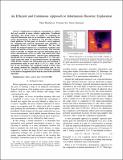| dc.contributor.author | Henderson, Theia | |
| dc.contributor.author | Sze, Vivienne | |
| dc.contributor.author | Karaman, Sertac | |
| dc.date.accessioned | 2021-04-13T14:36:37Z | |
| dc.date.available | 2021-04-13T14:36:37Z | |
| dc.date.issued | 2020-09 | |
| dc.date.submitted | 2020-05 | |
| dc.identifier.isbn | 9781728173955 | |
| dc.identifier.issn | 2577-087X | |
| dc.identifier.uri | https://hdl.handle.net/1721.1/130465 | |
| dc.description.abstract | Exploration of unknown environments is embedded and essential in many robotics applications. Traditional algorithms, that decide where to explore by computing the expected information gain of an incomplete map from future sensor measurements, are limited to very powerful computational platforms. In this paper, we describe a novel approach for computing this expected information gain efficiently, as principally derived via mutual information. The key idea behind the proposed approach is a continuous occupancy map framework and the recursive structure it reveals. This structure makes it possible to compute the expected information gain of sensor measurements across an entire map much faster than computing each measurements' expected gain independently. Specifically, for an occupancy map composed of |M| cells and a range sensor that emits |Θ| measurement beams, the algorithm (titled FCMI) computes the information gain corresponding to measurements made at each cell in O(|Θ||M|) steps. To the best of our knowledge, this complexity bound is better than all existing methods for computing information gain. In our experiments, we observe that this novel, continuous approach is two orders of magnitude faster than the state-of-the-art FSMI algorithm. | en_US |
| dc.language.iso | en | |
| dc.publisher | Institute of Electrical and Electronics Engineers (IEEE) | en_US |
| dc.relation.isversionof | http://dx.doi.org/10.1109/icra40945.2020.9196592 | en_US |
| dc.rights | Creative Commons Attribution-Noncommercial-Share Alike | en_US |
| dc.rights.uri | http://creativecommons.org/licenses/by-nc-sa/4.0/ | en_US |
| dc.source | MIT web domain | en_US |
| dc.title | An Efficient and Continuous Approach to Information-Theoretic Exploration | en_US |
| dc.type | Article | en_US |
| dc.identifier.citation | Henderson, Theia et al. "An Efficient and Continuous Approach to Information-Theoretic Exploration." 2020 IEEE International Conference on Robotics and Automation, May-August 2020, virtual event (Paris, France), Institute of Electrical and Electronics Engineers, September 2020. © 2020 IEEE | en_US |
| dc.contributor.department | Massachusetts Institute of Technology. Department of Electrical Engineering and Computer Science | en_US |
| dc.contributor.department | Massachusetts Institute of Technology. Microsystems Technology Laboratories | en_US |
| dc.relation.journal | 2020 IEEE International Conference on Robotics and Automation | en_US |
| dc.eprint.version | Author's final manuscript | en_US |
| dc.type.uri | http://purl.org/eprint/type/ConferencePaper | en_US |
| eprint.status | http://purl.org/eprint/status/NonPeerReviewed | en_US |
| dc.date.updated | 2021-04-12T17:15:41Z | |
| dspace.orderedauthors | Henderson, T; Sze, V; Karaman, S | en_US |
| dspace.date.submission | 2021-04-12T17:15:42Z | |
| mit.license | OPEN_ACCESS_POLICY | |
| mit.metadata.status | Complete | |
